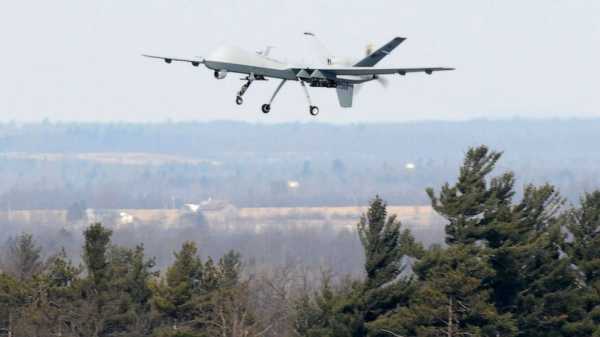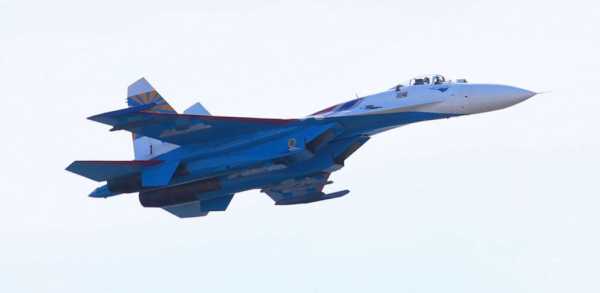A Russian fighter jet collided with the rear propeller of an unmanned U.S. military drone in the international airspace over the Black Sea on Tuesday morning, forcing the U.S. to bring the drone down off the coast of Ukraine, U.S. officials said.
The incident, which involved two Russian Su-27 jets, was denounced as "unsafe and unprofessional" by the U.S. State Department. A spokesman called it a "brazen violation of international law" that led to the summoning of Russia's ambassador for a diplomatic meeting in Washington.
Afterward, the ambassador, Anatoly Antonov, insisted that the Russian jets had not hit or fired on the drone, a MQ-9 Reaper.
The Russians claimed Tuesday that the Reaper drone was acting as an "intruder" and flying toward Russia's borders.
U.S. European Command, or EUCOM, labeled the incident as "dangerous" and said in a statement that it could "lead to miscalculation and unintended escalation."
A U.S. official was equally blunt — telling ABC News that the Russian pilot who hit the drone, seemingly unintentionally, was acting "reckless and juvenile."
MORE: Russia-Ukraine live updates: White House says Russian attack 'brutalizing'
"At approximately 7:03 AM [local time], one of the Russian Su-27 aircraft struck the propeller of the MQ-9, causing U.S. forces to have to bring the MQ-9 down in international waters," EUCOM said in its statement.
EUCOM said the incident "demonstrates a lack of competence in addition to being unsafe and unprofessional."
"Several times before the collision, the Su-27s dumped fuel on and flew in front of the MQ-9 in a reckless, environmentally unsound and unprofessional manner," EUCOM added.

An MQ-9 Reaper takes off at Wheeler-Sack Army Air Field in Fort Drum, N.Y., Feb. 14, 2012.U.S. Air Force, FILE
The incident is apparently the latest in what EUCOM described as "a pattern of dangerous actions by Russian pilots while interacting with U.S. and Allied aircraft over international airspace, including over the Black Sea."
"Our MQ-9 aircraft was conducting routine operations in international airspace when it was intercepted and hit by a Russian aircraft, resulting in a crash and complete loss of the MQ-9," U.S. Air Force Gen. James B. Hecker, commander of the U.S. Air Forces in Europe and Africa, said in a statement. "In fact, this unsafe and unprofessional act by the Russians nearly caused both aircraft to crash."
"U.S. and Allied aircraft will continue to operate in international airspace and we call on the Russians to conduct themselves professionally and safely," Hecker added.
The unarmed MQ-9 drone had taken off from Romania and was flying at an altitude of 25,000 feet in international airspace southwest of Crimea with its transponder on when it was intercepted by the two Russian fighter jets, a U.S. Air Force official told ABC News.
Over a span of at least 30 minutes, the two jets executed 19 close passes by the drone, spraying some of their jet fuel on the craft during the last three or four of those passes, the official said.
The collision occurred on the last pass as one of the Su-27s approached the drone at a high rate of speed from behind, according to the official. As the jet pulled up, it collided with the MQ-9's rear propeller.
One of the MQ-9's propeller blades was bent in the collision and though there was a momentary loss of contact, controllers were able to glide the drone into the Black Sea "a fair distance" from where the collision had occurred, the official said.
"There's no concern for sensitive information being obtained from the drone but the U.S. is looking at all options at this time as it considers next steps," said another U.S. official.
The first official described the collision as resulting from "the pure incompetence" of the Russian pilot whose actions were "flat-out dumb."
The official said that Russian fighters had sprayed their jet fuel at manned aircraft during previous encounters, but Tuesday's incident was the first time that an attempt had been made to spray an unmanned U.S. military drone.
Pentagon spokesman Brig. Gen. Pat Ryder separately said Tuesday that the Russian aircraft were able to land after the collision though he did not provide details. He said that Russia had not recovered the drone.
White House spokesman John Kirby told reporters on Tuesday that "it is not uncommon" for Russian aircraft to intercept U.S. aircraft over the Black Sea but this is "the first time" such a run-in "resulted in the splashing of one of our drones."
President Joe Biden was briefed on the incident by his national security adviser, Jake Sullivan, Kirby said.
The U.S. regularly flies manned and unmanned surveillance flights in international airspace close to Ukraine without entering its 12-mile territorial limit.
The flights are part of the overall U.S. intelligence effort to obtain information about Russia's invasion of Ukraine, which has dragged on for 13 months.

Russian Knights flying Sukhoi Su-27s perform aerobatic maneuvers during their show over Saint-Petersburg, Russia on April 25, 2015.Anadolu Agency/Getty Images, FILE
State Department spokesperson Ned Price said at a Tuesday afternoon briefing that the U.S. was "engaging directly with the Russians" to communicate objections to what he called the country's "unsafe, unprofessional intercept."
"We are summoning the Russian ambassador to the department where we will convey this message," he said, adding, "In Moscow, meanwhile, Ambassador [Lynne] Tracy has conveyed a strong message to the Russian Ministry of Foreign Affairs."
Sources subsequently told ABC News that Anatoly Antonov, Russia's ambassador to the U.S., came to the State Department on Tuesday afternoon and met with Assistant Secretary for European and Eurasian Affairs Karen Donfried "to discuss Russia's unsafe and unprofessional operations over the Black Sea, which resulted in the downing today of an unmanned U.S. aircraft."
Their meeting lasted the better part of an hour.
Russia's Defense Ministry said in a statement that the American drone was flying "in the direction of the state border of the Russian Federation" and that fighter jets were sent to intercept it.
"As a result of sharp maneuvering, the U.S. drone went into uncontrolled flight with a loss of altitude and collided with the water surface," according to the Russian statement.
At his briefing, Price countered the Russian version of events. "We are not in a position to speak to what the Russians intended to do. We are not in a position to speak to what their motivations might have been. We are in a position to speak to what happened," he said.
Speaking outside the State Department after his meeting, Antonov maintained to reporters that Russia had operated carefully while responding to what it suspected could have been a threat.
"What will be the reaction of the United States if you see such Russian drone very close, for example, to San Francisco or New York?" Antonov asked rhetorically, later saying he mentioned the same analogy to Assistant Secretary Donfried.
Of his meeting with Donfried, Antonov said, "We have exchanged our remarks on this issue, because we have some differences [on] what has happened today, but it seems to me it was a constructive conversation."
"I hope she has understood what I have mentioned," Antonov said.
Sourse: abcnews.go.com






